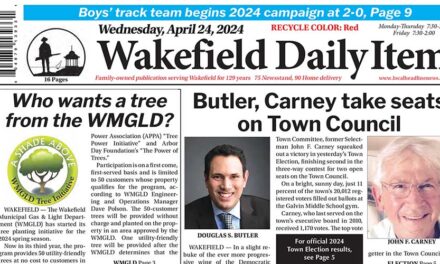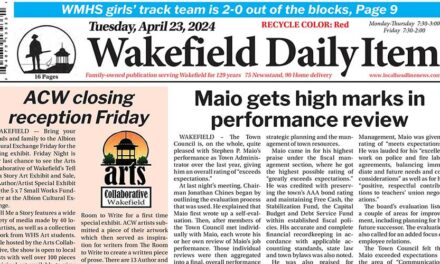By BOB BURGESS
WAKEFIELD — The town’s monetary overseers and some elected officials were jumping for joy last week, and with good reason: Standard & Poor’s gave great marks to Wakefield’s financial health by awarding municipal government a ‘AAA’ long-term credit rating, the highest possible.
The agency also assigned the town its ‘SP-1+’ short term rating for a series of anticipation notes payable on May 20 of next year. This rating, according to the report received last week, “reflects our view of the town’s strong ability to pay principal and interest when the notes come due. Wakefield’s market risk profile is low, in our view, as it maintains strong legal authority to issue long-term debt to take out (bond anticipation notes), and is a frequent issuer, providing regular disclosure to market participants.”
The ‘AAA’ long-term rating, the report continues, reflects the following:
• Very strong management, with sound financial policies.
• Strong budgetary performance, with an operating surplus in the general fund and balanced operating results at the total governmental fund level.
• Strong budgetary flexibility, with an available fund balance in fiscal year 2014 of 14 percent of operating expenditures.
• Very strong liquidity, with total government available cash of 21.1 percent of total governmental fund expenditures and 4.8 times governmental debt service and access to external liquidity Standard & Poor’s considers strong.
• Strong debt and contingent liability position, with debt service carrying charges of 4.4 percent and net direct debt that is 71.4 percent of total governmental fund revenue and low overall net debt at less than 3 percent of market value.
• A strong institutional framework score.
The town is one of 55 communities in Massachusetts receiving Standard & Poor’s highest rating.
Town Administrator Stephen P. Maio explained, “We would not have been able to achieve such a high rating id it were not for the strong policy and direction set by the Board of Selectmen and Finance Committee. Both boards adopted and supported polices which reviewed every area of fiscal management from revenue forecasting to capital planning to reserve targets as well as prudently investing our reserves.
“Also, the financial management team of John McCarthy, Kevin Gill and Victor Santaniello not only set and implement strong management in their areas but also participate in the ratings meetings with S&P. We have also received great advice and service from our bond counsel Peter Frazier and Abby Jeffers of First Southwest have been an invaluable resource.
“The big winner is the taxpayer as we continue to receive lower and lower interest rates on the projects we have before us,” Maio concluded in an e-mail.
Selectmen Chairman Brian Falvey added, “This rating is testament to the sound financial management and fiscal responsibility Steve Maio has shown since becoming Town Administrator. The Standard & Poor rating is based on the soundness of the town’s finances and capacity to repay its obligations. An ‘AAA’ rating means that, fiscally, the Town of Wakefield ranks at the top among communities not only in the Commonwealth of Massachusetts, but nationwide.
“We are in a great place to make the changes and improvements we seek to make, while also ensuring future Wakefield generations are set up for financial success,” Falvey said.
The report on Wakefield’s sound fiscal health came just a few days before Town Meeting Monday passed an $84,926,792 operating budget for the year beginning July 1. That budget included an 11.4 percent increase in spending on local schools.
In a forword to the 2015 Town Meeting appropriations booklet that can be found on the town’s website, Finance Committee Chairman Gerard Leeman writes, “Pay yourself first. It is a simple maxim that reinforces the value of routinely and continuously reserving a portion of collections as savings. It is a practice observed by prudent individuals managing household finances as well as professional managers of the largest and most complex organizations. The Town of Wakefield has diligently built its various cash reserves in recent years even while making important outlays to fund infrastructure modernization and service enhancements.
“That past diligence now presents us with a challenge less often discussed but equally important to anyone considering how best to address unlimited wants with limited means — when and how to deploy reserved cash. (The fiscal year 2016 budget passed Monday night) represents a plan to address pressing needs in a way that minimizes impact on the taxpayer and affirms the Town’s commitment to maintaining reserves at approximately 10 percent of annual operating expenses. … This budget is a bold attempt to address needs both perennial and emergent, be they unfunded state and federal mandates, impacts of weather events or the evolving wants of the community.
“Boldness in budgeting, however, must always be complemented with meticulous implementation and rigorous oversight. In order to realize the value to taxpayers, students and the community at large promised in the FY 2016 budget we will likely have to continue our track record of innovation, collaboration, capital investment and exercising restraint in future years.”




